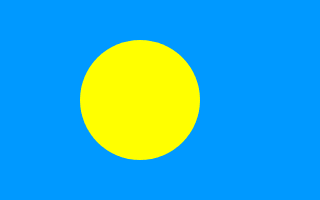Palau - Government

Based on the etymolgy of Palau, it was from the Palauan name for the islands, Belau, which likely derives from the Palauan word "beluu" meaning "village". The Government system in this country is the presidential republic in free association with the US type and the different Administrative divisions includes: 16 states; Aimeliik, Airai, Angaur, Hatohobei, Kayangel, Koror, Melekeok, Ngaraard, Ngarchelong, Ngardmau, Ngatpang, Ngchesar, Ngeremlengui, Ngiwal, Peleliu, Sonsorol
National symbols
Bai (native meeting house); national colors: blue, yellow.
The flag
The National flag of Palau has light blue with a large yellow disk shifted slightly to the hoist side; the blue color represents the ocean, the disk represents the moon; Palauans consider the full moon to be the optimum time for human activity; it is also considered a symbol of peace, love, and tranquility.
Info
The National Anthem
| Title | "Belau rekid" (Our Palau) |
|---|---|
| Lyric/music | multiple/Ymesei O. EZEKIEL |
Info
note: adopted 1980
More about the government of Palau
| Date of Independence | 1 October 1994 (from the US-administered UN trusteeship) |
|---|---|
| National holiday | Constitution Day, 9 July (1981), day of a national referendum to pass the new constitution; Independence Day, 1 October (1994) |
| Legal system | mixed legal system of civil, common, and customary law |
| International law organization participation | has not submitted an ICJ jurisdiction declaration; non-party state to the ICCt |
| Constitution | |
| History | Ratified 9 July 1980, effective 1 January 1981 |
| Amendment process | Proposed by a constitutional convention (held at least once every 15 years with voter approval), by public petition of at least 25% of eligible voters, or by a resolution adopted by at least three fourths of National Congress members; passage requires approval by a majority of votes in at least three fourths of the states in the next regular general election |
| Citizenship | |
| Citizenship by birth | no |
| Citizenship by descent only | at least one parent must be a citizen of Palau |
| Dual citizenship recognized | no |
| Residency requirement for naturalization | note - no procedure for naturalization |
| Executive Branch | |
| Chief of state | President Surangel WHIPPS Jr. (since 21 January 2021) |
| Head of government | President Surangel WHIPPS Jr. (since 21 January 2021) |
| Cabinet | Cabinet appointed by the president with the advice and consent of the Senate; also includes the vice president; the Council of Chiefs consists of chiefs from each of the states who advise the president on issues concerning traditional laws, customs, and their relationship to the constitution and laws of Palau |
| Elections/appointments | president and vice president directly elected on separate ballots by absolute majority popular vote in 2 rounds if needed for a 4-year term (eligible for a second term); election last held on 5 November 2024 (next to be held November 2028) |
| Election results | 2024: Surangel WHIPPS, Jr. elected president in second round; percent of vote - Surangel WHIPPS, Jr. (independent) 57.7%, Tommy REMENGESAU (independent) 42.1%, other 0.2% 2020: Surangel WHIPPS, Jr. elected president in second round; percent of vote - Surangel WHIPPS, Jr. (independent) 56.7%, Raynold OILUCH (independent) 43.3% |
| Legislative branch | |
| Legislature name | National Congress (Olbiil Era Kelulau) |
| Legislative structure | Bicameral |
| Judicial branch | |
| Highest court(s) | Supreme Court (consists of the chief justice and 3 associate justices organized into appellate trial divisions; the Supreme Court organization also includes the Common Pleas and Land Courts) |
| Judge selection and term of office | Justices nominated by a 7-member independent body consisting of judges, presidential appointees, and lawyers and appointed by the president; judges can serve until mandatory retirement at age 65 |
| Subordinate courts | National Court and other inferior courts |
| Diplomatic representation in the US | |
| Chief of mission | Ambassador Hersey KYOTA (since 12 November 1997) |
| Chancery | 1701 Pennsylvania Avenue NW, Suite 200, Washington, DC 20006 |
| Telephone | [1] (202) 349-8598 |
| FAX | [1] (202) 452-6281 |
| Email address and website | [email protected] https://www.palauembassy.org/ |
| Consulate(s) | Tamuning (Guam) |
| Diplomatic representation from the US | |
| Chief of mission | Ambassador Joel EHRENDREICH (since 29 September 2023) |
| Embassy | Omsangel/Beklelachieb, Airai 96940 |
| Mailing address | 4260 Koror Place, Washington, DC 20521-4260 |
| Telephone | [680] 587-2920 |
| FAX | [680] 587-2911 |
| Email address and website | [email protected] https://pw.usembassy.gov/ |
| National heritage | |
| Total World Heritage Sites | 1 (mixed) |
| Selected World Heritage Site locales | Rock Islands Southern Lagoon |
Key Political parties and their leaders in Palau
Info
International organization participation
All Important Facts about Palau
Want to know more about Palau? Check all different factbooks for Palau below.









